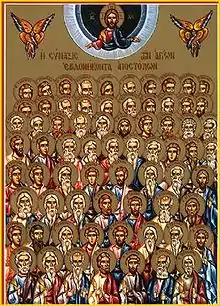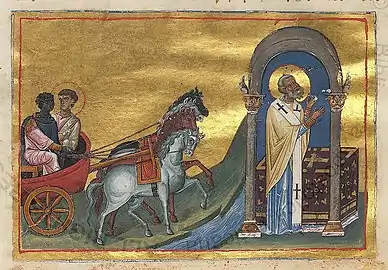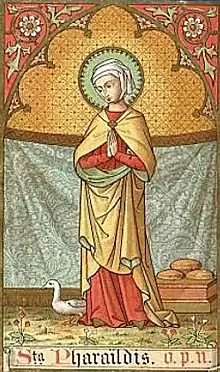January 4 (Eastern Orthodox liturgics)
January 3 - Eastern Orthodox liturgical calendar - January 5
All fixed commemorations below are observed on January 17 by Orthodox Churches on the Old Calendar.[note 1]
For January 4, Orthodox Churches on the Old Calendar commemorate the Saints listed on December 22.
Saints
- Synaxis of the Seventy Apostles.[1][3][4][note 3]
- Martyr Djan Darada, the Ethiopian eunuch of Queen Candace (1st century)[1] (see also: June 17, August 27)
- Martyrs Chrysanthus and Euthymia.[7]
- Martyrs Zosimas the Hermit and Athanasius the Commentarisius (prison warden), anchorites of Cilicia (3rd-4th century)[1][8][9][10]
- Venerable Theoprobus of Karpasia, Bishop of Karpasia in Cyprus (4th century)[11]
- Venerable Apollinaria the Senator (5th century)[12]
- Venerable Evagrius (fellow-ascetic of St. Shio of Mgvime), with St. Elias the Deacon, and other Disciples of the Thirteen Syrian Fathers, of the Shio-Mgvime Monastery in Georgia (6th century)[1][13][14]
- The Holy Six Martyrs.[15][note 4]
- Saint Euthymius the Younger of Thessalonica (Euthymius the New), monk.[1][16]
- Venerable Timothy the Stylite (872)[17]
- Hieromartyr Alexander, Bishop.[18]
- Martyr Uvelicius.[18]
- Martyr Amma.[18]
Pre-Schism Western saints
- Saint Linus, the first Pope of Rome (c. 76)[19][note 5] (In the East: Jan 4 and Nov 5)
- Saint Clement I, one of the Seventy Apostles, he was the third Pope of Rome (c. 101)[19] (In the East: Jan 4, Apr 22, Sept 10 and Nov 25)
- Saint Mavilus (Majulus), a martyr in Hadrumetum in North Africa, thrown to wild beasts at the time of Caracalla (212)[19][note 6]
- Martyrs Priscus, Priscillian and Benedicta, in Rome (c. 361 - 363)[19][note 7]
- Martyr Dafrosa (Affrosa), the mother of St Bibiana, was martyred in Rome under Julian the Apostate (c. 361 - 363)[19][note 8]
- Martyrs Aquilinus, Geminus, Eugene, Marcian, Quintus, Theodotus and Tryphon, in North Africa under the Arian Hunneric, King of the Vandals (c. 484)[19]
- Saint Gregory of Langres, Bishop of Langres in Gaul, renowned for miracles (539-540)[1][19][20][note 9]
- Saint Ferreolus of Uzès, Bishop of Uzès (581)[19][note 10]
- Saint Pharäildis (Vareide, Verylde, Veerle), one of the patron-saints of Ghent (c. 740)[19]
- Saint Rigobert, Archbishop of Rheims and Confessor (c. 745)[19][20][note 11]
- Venerable Theoctistus of Sicily, Abbot at Cucomo (Coucouma, Coucoumis) in Sicily (800)[1][21]
- Saint Libentius (Liäwizo I), born in Swabia in Germany, he became Archbishop of Hamburg in 988 (1013)[19]
Post-Schism Orthodox saints
- Venerable Hieromartyr Abbot Euthymius, and twelve Monk-martyrs of Vatopedi Monastery, on Mt. Athos, who suffered martyrdom for denouncing the Latinizing rulers Michael Paleologos and John Bekkos as heretics (1285)[1][22][23][24]
- Repose of St. Eustathius I of Serbia (Eustace of Serbia, Jevstatije I), Archbishop of Serbia (1286)[1][25][26]
- Saint Aquila (Aquilae, Achillios), Deacon of the Kiev Caves Monastery (14th century)[1][27][28]
- Venerable Symeon of Smolensk, Metropolitan of Smolensk (1699)[1][29][note 12]
- New Monk-martyr Onuphrius Manassias of Gabrovo and Chilandar Monastery, Mt. Athos, on Chios (1818)[1][30][31]
- Venerable Nikephoros the Leper (1964)[32][33][34][note 13]
New martyrs and confessors
- New Hieromartyr Alexander Yuzefovitch, Priest, at Alma-Ata (1921)[6][40]
- New Hieromartyr Philip Gregoriev, Protopresbyter, at Alma-Ata (1933)[6][40][41]
- New Hieromartyr Stephen Ponomarev, Priest (1933)[6][41]
- New Hieromartyr Nicholas Maslov, Priest, at Alma-Ata (1939)[6][40][41]
- New Hieromartyr Paul Felitsyn, Priest (1941)[6][41]
Other commemorations
- Finding of the holy relics (January 4, 1974) of New Martyr John the ex-Muslim of Konitsa (John of Ioannina) (September 23, 1814), in the Holy Monastery of Prousou in Evrytania, Greece.[42]
Icon gallery
 Icon of the Seventy Apostles.
Icon of the Seventy Apostles. The Ethiopian eunuch with St. Philip the Deacon
The Ethiopian eunuch with St. Philip the Deacon
(Menologion of Basil II).jpg.webp) St. Zosimas the Hermit and Athanasius the Notary, anchorites of Cilicia
St. Zosimas the Hermit and Athanasius the Notary, anchorites of Cilicia
(Menologion of Basil II) St. Pharäildis.
St. Pharäildis.
Notes
- The notation Old Style or (OS) is sometimes used to indicate a date in the Julian Calendar (which is used by churches on the "Old Calendar").
The notation New Style or (NS), indicates a date in the Revised Julian calendar (which is used by churches on the "New Calendar"). - The third day of the Forefeast of Theophany falls on January 4. The hymns compare the Feast of the Nativity with the coming Feast. "There shepherds saw the Child and were amazed; here the voice of the Father proclaims the only-begotten Son."[2]
- A widely accepted canon for the Seventy Apostles in the Orthodox Church is given in "The Great Collection of the Lives of the Saints, Volume 5: January", compiled by St. Demetrius of Rostov (†1709),[5] who consulted the Holy Scripture, the traditions passed down by the Church Fathers, and the accounts of trustworthy historians in attempting to correct the mistakes and uncertainties in the traditional lists of St. Dorotheus of Tyre (†362), and St. Hippolytus of Rome (†235):
- James the Brother of the Lord; Mark the Evangelist; Luke the Evangelist; Cleopas the Brother of Righteous Joseph the Betrothed; Symeon the son of Cleopas; Barnabas; Justus; Thaddeus; Ananias; Stephen the Archdeacon, and Philip, Prochorus, Nicanor, Timon, and Parmenas of the seven deacons; Timothy; Titus; Philemon; Onesimus; Epaphras (Epaphroditus); Archippus; Silas; Silvanus; Crescens; Crispus; Epenetus; Andronicus; Stachys; Amplias; Urban; Narcissus, Apelles; Aristobulus; Herodion; Agabus; Rufus; Asyncritus; Phlegon; Hermes; Patrobus; Hermas; Linus; Gaius; Philologus; Luke (Lucius); Jason; Sosipater; Olympas; Tertius; Erastus; Quartus; Euodias; Onesiphorus; Clement; Sosthenes; Apollos; Tychicus; Epaphroditus; Carpus; Quadratus; Mark called John; Zenas; Aristarchus; Pudens; Trophimus; Mark; Artemas; Aquila; Fortunatus; Achaicus.[1][4]
- Also: Dionysius the Areopagite, and Simeon Niger,[6] who are numbered with the Seventy, bringing the total to seventy-two, the number mentioned in the variant reading of the Gospel, according to which "the Lord appeared unto the other seventy-two".
- Although the Synaxaristes call them "Martyrs", they reposed peacefully.
- A disciple of the Apostle Paul, he was one of the Seventy and is mentioned in 2 Timothy 4,21. He was Pope for twelve years (67-79) and is venerated as a martyr.
- "At Adrumetum, in Africa, in the persecution of Severus, the commemoration of St. Mavilus, martyr, who, being condemned by the most cruel president Scapula to be devoured by wild beasts, received the crown of martyrdom."[20]
- "At Rome, in the reign of the impious Julian, the holy martyrs Priscus, priest, Priscillian, cleric, and Benedicta, a religious woman, who ended their martyrdom by the sword."[20]
- "At Rome, under Julian the Apostate, blessed Dafrosa, wife of the martyr St. Flavian. After her husband had been killed, she was first banished, and then beheaded."[20]
- A governor of Autun in France. Later in life he lost his wife, was ordained priest and became Bishop of Langres, gaining a reputation for gentleness and understanding. He was the father of St Tetricus and the great-uncle of St Gregory of Tours.
- Born in Narbonne in France, he became Bishop of Uzès. He devoted himself in particular to converting Jews and was exiled by King Childebert on that account. He also founded a monastery.
- Monk and Abbot of Orbais in France, in 721 he became Archbishop of Rheims but some years later was banished by the Frank Charles Martel. He returned to Orbais and resumed monastic life. On being recalled to Rheims, he came to terms with the intruded bishop and himself became a hermit.
- See: (in Russian) Симеон (Молюков). Russian Wikipedia.
- In March 2020 it was reported by Archimandrite Ananias Koustenis in Athens, that a pious man told him that Venerable Nikephoros the Leper had appeared to him, asking him to tell everyone not to fear the Coronavirus. But rather to pray for his intercessions and God would heal and protect them through his prayers.[35][36][37]
At the end of March 2020, Venerable Nikephoros was also reported as appearing in Bulgaria over a period of three consecutive nights, asking all Christians to pray for his intercessions to God and to read the services.[38][39]
An intercessory canon to St Nikephoros has been published in Greek.
References
- January 4/January 17. Orthodox Calendar (PRAVOSLAVIE.RU).
- Forefeast of the Theophany of our Lord and Savior Jesus Christ. OCA - Feasts and Saints.
- Great Synaxaristes: (in Greek): Σύναξις τῶν Ἁγίων Ἑβδομήκοντα Ἀποστόλων. 4 ΙΑΝΟΥΑΡΙΟΥ. ΜΕΓΑΣ ΣΥΝΑΞΑΡΙΣΤΗΣ.
- Synaxis of the Seventy Apostles. OCA - Feasts and Saints.
- Dimitry of Rostov. The Synaxis of the Holy Seventy Apostles. From The Great Collection of the Lives of the Saints, Volume 5: January. Chrysostom Press.
- January 17 / January 4. HOLY TRINITY RUSSIAN ORTHODOX CHURCH (A parish of the Patriarchate of Moscow).
- Great Synaxaristes: (in Greek): Οἱ Ἅγιοι Χρύσανθος καὶ Εὐφημία. 4 ΙΑΝΟΥΑΡΙΟΥ. ΜΕΓΑΣ ΣΥΝΑΞΑΡΙΣΤΗΣ.
- Great Synaxaristes: (in Greek): Οἱ Ἅγιοι Ζώσιμος καὶ Ἀθανάσιος. 4 ΙΑΝΟΥΑΡΙΟΥ. ΜΕΓΑΣ ΣΥΝΑΞΑΡΙΣΤΗΣ.
- Martyr Zosimus the Hermit, Anchorite of Cilicia. OCA - Feasts and Saints.
- Martyr Athanasius the Superintendent of Prisoners, Anchorite of Cilicia. OCA - Feasts and Saints.
- Great Synaxaristes: (in Greek): Ὁ Ὅσιος Θεόπροβος Ἐπίσκοπος Καρπασίας Κύπρου. 4 ΙΑΝΟΥΑΡΙΟΥ. ΜΕΓΑΣ ΣΥΝΑΞΑΡΙΣΤΗΣ.
- Great Synaxaristes: (in Greek): Ἡ Ὁσία Ἀπολλιναρία ἡ Συγκλητική. 4 ΙΑΝΟΥΑΡΙΟΥ. ΜΕΓΑΣ ΣΥΝΑΞΑΡΙΣΤΗΣ.
- Great Synaxaristes: (in Greek): Οἱ Ὅσιοι Εὐάγριος καὶ Σίος ἐκ Γεωργίας. 4 ΙΑΝΟΥΑΡΙΟΥ. ΜΕΓΑΣ ΣΥΝΑΞΑΡΙΣΤΗΣ.
- Martyrs of the Shio-Mgvime Monastery. OCA - Feasts and Saints.
- Great Synaxaristes: (in Greek): Οἱ Ἅγιοι Ἕξι Μάρτυρες. 4 ΙΑΝΟΥΑΡΙΟΥ. ΜΕΓΑΣ ΣΥΝΑΞΑΡΙΣΤΗΣ.
- Great Synaxaristes: (in Greek): Ὁ Ὅσιος Εὐθύμιος ὁ Νέος. 4 ΙΑΝΟΥΑΡΙΟΥ. ΜΕΓΑΣ ΣΥΝΑΞΑΡΙΣΤΗΣ.
- Great Synaxaristes: (in Greek): Ὁ Ὅσιος Τιμόθεος ὁ Στυλίτης. 4 ΙΑΝΟΥΑΡΙΟΥ. ΜΕΓΑΣ ΣΥΝΑΞΑΡΙΣΤΗΣ.
- Настольная книга священнослужителя. Т. 3. - М.: Издательство Московской Патриархии, 1979. - С. 460
- January 4. Latin Saints of the Orthodox Patriarchate of Rome.
- The Roman Martyrology. Transl. by the Archbishop of Baltimore. Last Edition, According to the Copy Printed at Rome in 1914. Revised Edition, with the Imprimatur of His Eminence Cardinal Gibbons. Baltimore: John Murphy Company, 1916. pp.5-6.
- Great Synaxaristes: (in Greek): Ὁ Ὅσιος Θεόκτιστος. 4 ΙΑΝΟΥΑΡΙΟΥ. ΜΕΓΑΣ ΣΥΝΑΞΑΡΙΣΤΗΣ.
- Great Synaxaristes: (in Greek): Ὁ Ὅσιος Εὐθύμιος Ἡγούμενος Μονῆς Βατοπαιδίου και οἱ σὺν αὐτῷ μαρτυρήσαντες 12 Μοναχοί. 4 ΙΑΝΟΥΑΡΙΟΥ. ΜΕΓΑΣ ΣΥΝΑΞΑΡΙΣΤΗΣ.
- Venerable Euthymius Martyred at Vatopedi of Mt Athos. OCA - Feasts and Saints.
- 12 Monks, Martyred at Vatopedi on Mt Athos. OCA - Feasts and Saints.
- Great Synaxaristes: (in Greek): Ὁ Ἅγιος Εὐστάθιος Ἀρχιεπίσκοπος Σερβίας. 4 ΙΑΝΟΥΑΡΙΟΥ. ΜΕΓΑΣ ΣΥΝΑΞΑΡΙΣΤΗΣ.
- Repose of St Eustathius I, Archbishop of Serbia. OCA - Feasts and Saints.
- Great Synaxaristes: (in Greek): Ὁ Ὅσιος Ἀχίλλιος ὁ Διάκονος. 4 ΙΑΝΟΥΑΡΙΟΥ. ΜΕΓΑΣ ΣΥΝΑΞΑΡΙΣΤΗΣ.
- St Aquila, Deacon, of the Kiev Caves. OCA - Feasts and Saints.
- Great Synaxaristes: (in Greek): Ὁ Ὅσιος Συμεὼν ἐκ Ρωσίας. 4 ΙΑΝΟΥΑΡΙΟΥ. ΜΕΓΑΣ ΣΥΝΑΞΑΡΙΣΤΗΣ.
- Great Synaxaristes: (in Greek): Ὁ Ἅγιος Ὀνούφριος ὁ Ὁσιομάρτυρας ὁ Νέος ὁ ἐν Χίῳ. 4 ΙΑΝΟΥΑΡΙΟΥ. ΜΕΓΑΣ ΣΥΝΑΞΑΡΙΣΤΗΣ.
- Venerable Onuphrius of Hilandar (Mt. Athos) the Newmartyr. OCA - Feasts and Saints.
- Saint Nikephoros the Leper. OCA - Lives of the Saints.
- (in Greek) Οσιος Νικηφορος Ο Λεπρος (1890 - 1964). Ορθόδοξος Συναξαριστής. 04/01/2014.
- (in Greek) Νικηφόρος ο λεπρός (1890-1964) της καρτερίας αθλητής λαμπρός. Impankratoros.gr (Holy Monastery of Pantokratoros, Melisohori). Retrieved: 30 October 2014.
- MONASTERIES, CHURCHES OFFERING PRAYERS TO ST. NIKEPHOROS THE LEPER AGAINST CORONAVIRUS. Orthodox Christianity. Wayne, West Virginia, March 18, 2020.
- (in Greek) Ο ΑΓ. ΝΙΚΗΦΟΡΟΣ Ο ΛΕΠΡΟΣ ΕΜΦΑΝΙΣΘΗΚΕ ΚΑΙ ΕΙΠΕ ΟΙ ΕΛΛΗΝΕΣ ΝΑ ΜΗΝ ΦΟΒΟΥΝΤΑΙ ΤΟΝ ΚΟΡΟΝΟΙΟ. ΕΚΚΛΗΣΙΑ ONLINE (EKKLISIAONLINE.GR). 09 Μαρτίου 2020 01:16. Retrieved: 14 March, 2020.
- Papa Demetri. Spiritual Food for the 2nd Friday of the Great Fast. Orthodox Agape. March 13, 2020.
- Saint Nikephoros the Leper appears in Bulgaria and gives the cure for Coronavirus. The Ascetic Experience. Mar 29, 2020.
- (in Bulgarian) ЧУДО! Св.Никифор Прокажения се яви у нас: „България ще бъде запазена от коронавируса“. Добротолюбие (Dobrotoliubie). Retrieved April 1, 2020.
- The Autonomous Orthodox Metropolia of Western Europe and the Americas (ROCOR). St. Hilarion Calendar of Saints for the year of our Lord 2004. St. Hilarion Press (Austin, TX). p.5.
- (in Russian) 4 января (ст.ст.) 17 января 2013 (нов. ст.). Русская Православная Церковь Отдел внешних церковных связей. (DECR).
- Great Synaxaristes: (in Greek): Εὕρεσις Τιμίων Λειψάνων Ἁγίου Ἰωάννου τοῦ Νεομάρτυρος ἐκ Κονίτσης. 4 ΙΑΝΟΥΑΡΙΟΥ. ΜΕΓΑΣ ΣΥΝΑΞΑΡΙΣΤΗΣ.
Sources
- January 4/January 17. Orthodox Calendar (PRAVOSLAVIE.RU).
- January 17 / January 4. HOLY TRINITY RUSSIAN ORTHODOX CHURCH (A parish of the Patriarchate of Moscow).
- January 4. OCA - The Lives of the Saints.
- The Autonomous Orthodox Metropolia of Western Europe and the Americas (ROCOR). St. Hilarion Calendar of Saints for the year of our Lord 2004. St. Hilarion Press (Austin, TX). p. 5.
- January 4. Latin Saints of the Orthodox Patriarchate of Rome.
- The Roman Martyrology. Transl. by the Archbishop of Baltimore. Last Edition, According to the Copy Printed at Rome in 1914. Revised Edition, with the Imprimatur of His Eminence Cardinal Gibbons. Baltimore: John Murphy Company, 1916. pp. 5–6.
Greek Sources
- Great Synaxaristes: (in Greek) 4 ΙΑΝΟΥΑΡΙΟΥ. ΜΕΓΑΣ ΣΥΝΑΞΑΡΙΣΤΗΣ.
- (in Greek) Συναξαριστής. 4 Ιανουαρίου. ECCLESIA.GR. (H ΕΚΚΛΗΣΙΑ ΤΗΣ ΕΛΛΑΔΟΣ).
Russian Sources
- (in Russian) 17 января (4 января). Православная Энциклопедия под редакцией Патриарха Московского и всея Руси Кирилла (электронная версия). (Orthodox Encyclopedia - Pravenc.ru).
- (in Russian) 4 января (ст.ст.) 17 января 2013 (нов. ст.). Русская Православная Церковь Отдел внешних церковных связей. (DECR).
This article is issued from Wikipedia. The text is licensed under Creative Commons - Attribution - Sharealike. Additional terms may apply for the media files.

